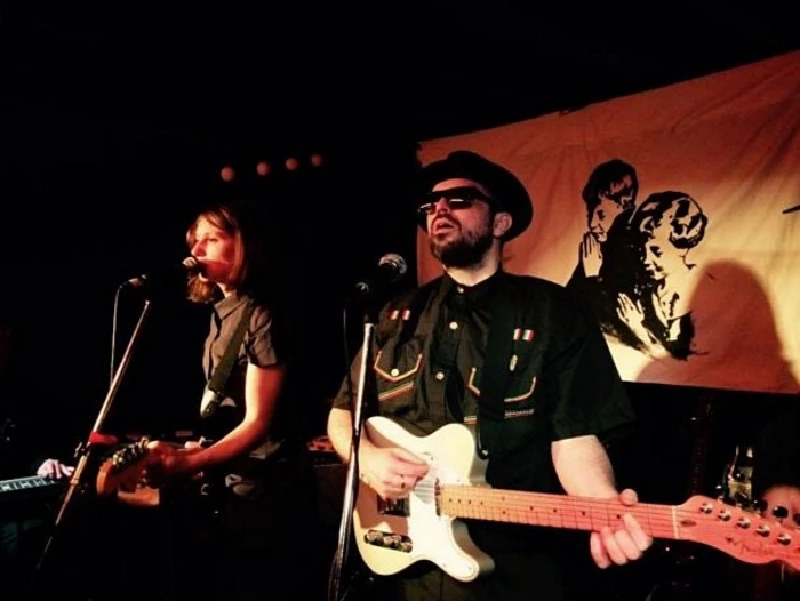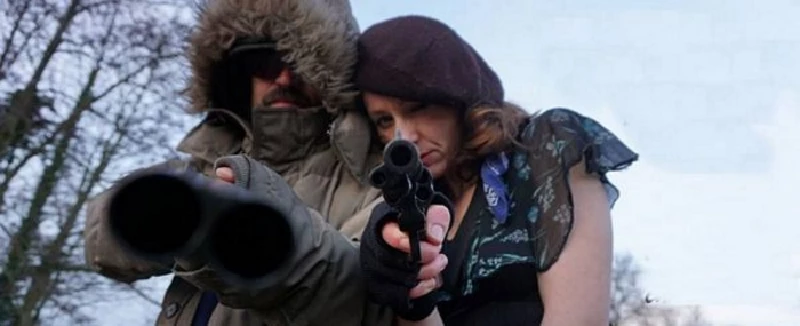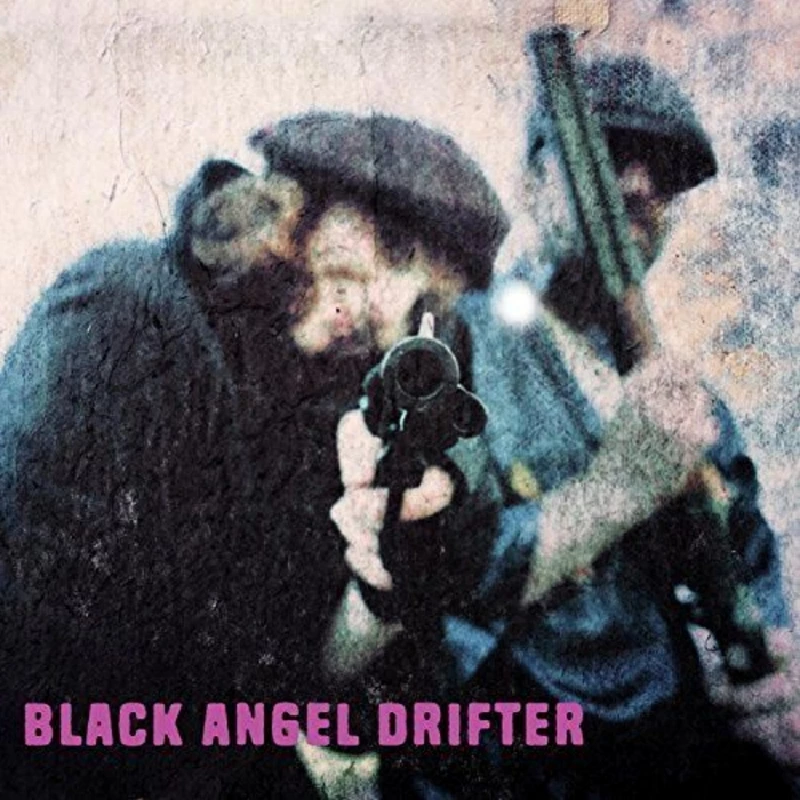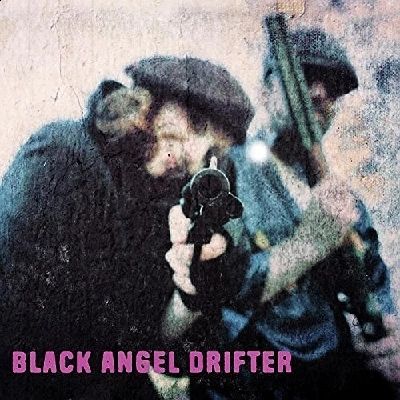Black Angel Drifter - Interview
by John Clarkson
published: 22 / 12 / 2016

intro
John Clarkson speaks to Robert 'Hacker' Jessett from acclaimed South London-based urban country band Morton Valence about his Ennio Morricone-influenced side project Black Angel Drifter and why their eponymous new record is their first and final album
"Anne and I went to see Ennio Morricone at the O2 last year," says Robert “Hacker” Jessett. "I hate the O2 but as it was Ennio Morricone we decided to go nonetheless, and literally from the moment he came on with his orchestra until he went off I was blubbering like a child and so was Anne. It was so emotional. It was the most incredible musical experience that I have ever had. He is such a great innovator. I love the way that he makes music for cowboy movies, but yet there is something fundamentally European about him as well. I am not sure whether we have failed or if we have succeeded, but we have tried to do something similar with this album as well." In what is his third interview with Pennyblackmusic, Jessett, who is the front man and guitarist with Morton Valence, is on the phone from his home in South London. He is talking about what will be the eponymous one and only album of Black Angel Drifter, his and musical partner Anne Gilpin's side project. Jessett founded Morton Valence with Gilpin, who plays keyboards and also shares co-vocals with him, in 2006. Describing their music as "urban country", they twist the Americana blueprint by combining its sounds and instruments with narratives and lyrics about their native South London. There have been four albums to date, 'Bob and Veronica Ride Again' (2009), 'Me and Home James '(2011), 'Left '(2014) and 'Another Country '(2015), all of which have come out on the band's own label, Bastard Recordings. Black Angel Drifter is, however, a very different project from Morton Valence. Conceived with the idea of lasting just long enough to release an album and to play one gig, which they do in early November at the Servant Jazz Quarters a few days after Pennyblackmusic’s interview, before breaking up, they take their influences, as well as from Morricone’s sweeping, scorched scores and Gothic Westerns, from psychedelia. Off-kilter and distorted, there is a hallucinatory, deranged edge to much of ‘Black Angel Drifter’. Blood-curdling screams, the noise of a rioting mob, gunfire, the crack of bullwhips and cricket noises can be heard in the the backdrop. At another point a girl appears panting on the soundtrack, but it is uncertain whether she is in the midst of sex or in agony. Many of the characters on ‘Black Angel Drifter’ come to meet violent deaths. Jessett and Gilpin croon their love for each other on opening track ‘Skylines Change/Genders Blur’, but with the song’s doomy, dirge-like score it is apparent that it can only finish for them in the same sort of blaze of self-destruction as Bonnie and Clyde, who Jessett and Gilpin, touting shotguns, impersonate on the album’s sleeve. The sinister ‘Black-Eyed Susan’ is a tale about filicide, and on the downbeat ‘If I Could Start Again’ its junkie narrator wakes up out of a blackout with the body of a girl beside him, not knowing whether he has murdered her or not. There is a menacing, dark cover also of Bob Dylan’s ‘Man in a Long Black Coat’ from his still under-rated 1989 record ‘Oh, Mercy’, and on the most bizarre moment of all on ‘Black Angel Drifter’ the concluding number ’24.33’ is exactly that number of minutes and seconds of the sound of more crickets, which is only punctured briefly by a short, sparse hidden track. ‘Black Angel Drifter’ has been released again on Bastard Recordings, and in appropriate indie style was recorded over the space of a week in a lock-up garage owned by Morton Valence pedal steel player Alan Cook in Whitstable near Canterbury. As well as Jessett, Gilpin and Cook, it also features Vladimir Straklj on bass, guitarist Stuart Jones and Japanese drummer Chizuru Nukui. Pennyblackmusic began by asking Robert Jessett why he and Anne Gilpin wanted to form another band outside Morton Valence and for it to be so brief-lived. PB: When did the idea of forming Black Angel Drifter come about? Did you always intend it as a side project or did it start out as a Morton Valence album? RJ: We had put out four Morton Valence albums which was great. We were really happy with the way Morton Valence was going but Anne and I both felt that it was time to do something new. Morton Valence had been together ten years. It felt like we were pressing the repeat button a little, and it was just time to do something different. I have always thought that, if you have any sort of values as a band and an artist, you should always be striving for something new rather than just sitting on your laurels and working to a formula. If you are going to do that you are more likely to make mistakes along the way, but all my favourite artists are like that. If you listen to Bob Dylan, you could always say that he was looking for something new. That made him the artist that he was. Not every Bob Dylan album is brilliant but a lot of them are. Some of them I would even put as some of the greatest albums ever made. That is really why we started Black Angel Drifter. Anne and myself have both got itchy feet, I guess. PB: You have said that Black Angel Drifter’s only ambition is to “have a career both brief and spectacular.” Why have you decided that it has to be brief rather than more long term? RJ: I am not looking to go on big, long tours or to go on and do loads of albums because we have done that with Morton Valence. I would rather keep it short, sweet, spectacular. It is a drag relentlessly trying to make it or to move your band forward. It is a very, very frustrating thing, so on this occasion I would rather go wham, bam, here you go, see you later. PB: Would you say that it has been "spectacular"? You have had some fabulous reviews for ‘Black Angel Drifter’. RJ: Well, in my opinion it has been spectacular but I would say that (Laughs). I do believe that it has been musically spectacular though. It is very different really from anything else around. We got very, very bored with the UK Americana scene because all the bands are very uninspiring. They are very formulaic. They all sound the same and they all dress the same and they all do this Gram Parsons wannabe thing. There are some notable exceptions. I think that Alan Tyler, for example, is great. There are some good bands, but in general the UK Americana scene is very, very dull. I don’t want to be anything to do with it really. We were in danger of going that way with Morton Valence, and I think that Black Angel Drifter is a departure from that. PB: ‘Black Angel Drifter’ was recorded quickly in a garage. Why did you decide to go there rather than perhaps a more conventional studio? RJ: Mainly for financial reasons. A conventional studio is very expensive. Alan Cook, our pedal steel player, has got a little garage down in Whitstable in Kent. We recorded most of the vocals and guitars and drums down there, and then I brought it all home and mixed it where I added the odd bullwhip and siren and cricket (Laughs). PB: Who are the three other musicians, Vladimir Straklj, Stuart Jones and Chizuru Nukui, who played with you on this? RJ: Vladimir is a very well-respected musician who plays in a Balkan gypsy folk band called Paprika and he also plays in Cerys Matthews’ band. Chizuru, who is Japanese, is my wife and, as you can hear, the drumming is very basic. She used to play Taiko drums in Japan, and she basically stands up and plays the floor tom very much in the style of Moe Tucker from the Velvet Underground. PB: And Stuart Jones? Who is he? RJ: Stuart Jones actually moved to Canada so logistically it is a little bit difficult for him to be in the band now (Laughs), so now we have another guitarist Masa Mitobe, who is a Japanese guy and who will be doing the gig with us at the Servant Jazz Quarters. He is very eccentric and fits perfectly into the group. He is not the greatest guitar player in the world but it doesn’t matter. We are not looking for a professional session musician. That would be really boring. We are not that kind of band. We have got a very much DIY punk ethic. PB: You have created a world in ‘Black Angel Drifter’ in which life is not worth very much and a lot of the characters – and particularly those on ‘Skylines Change/Genders Blur’’, ‘Black-Eyed Susan’ and 'If I Could Start Over Again' – all seem destined to go out in a blaze of glory or mis-glory. Given the briefness of the project were these songs written with that in mind? RJ: It wasn’t intended, when we wrote them but it does fit in with the general tone of the album, doesn’t it? Two of the songs that you mention are actually collaborations. ‘Skylines Change/Genders Blur’ is something that I co-wrote with Johny Brown from the Band of Holy Joy. I did a project with Johny a long time ago, and there were some songs kicking around from then of which that was one of them. I always liked that song, but Johny actually wrote most of the lyrics. He is kind of paraphrasing Lou Reed a little bit when he says “a day with you beats anybody’s year.” I think that comes from ‘Metal Machine Music’. The words for the second one, ‘Black-Eyed Susan’, were written by a guy called David Cameron, who has rather an unfortunate name. He is from Scotland and he is quite a well-respected poet, and is trying to reclaim his name back now that the other David Cameron has pissed off and left the country in a fucking state (Laughs). So, those two particular songs were collaborations with other people which again makes Black Angel Drifter different from Morton Valence in which I generally write allthe lyrics and the songs, unless, of course, it is a cover version. For this album I found myself collaborating a lot more with other people which has been great. PB: The cover shows you and Anne impersonating Bonnie and Clyde. You also appeared on the front cover of ‘Bob and Veronica Rides Again’, the first Morton Valence, as Bonnie and Clyde. Why did you decide to resurrect this? RJ: I have always liked the idea of the outlaw or the outsider, especially the couple who are the outsiders. Me and Anne are a bit like that I suppose. It could be seen as a cliché, but I don’t really care if people see it like that. We have always felt like outsiders, especially on the music scene. Originally we were going to call the project Bob and Veronica as supposed to Black Angel Drifter but I wanted to cut the connection to Morton Valence as much as possible, so we became Black Angel Drifter instead. The main reason though the project was going to be called Bob and Veronica was after ‘Bob and Veronica Rides Again’, so when you see the pictures of me and Anne with the guns in Bonnie and Clyde pose just like on the first Morton Valence album it does, despite all my efforts, go back to that, I suppose (Laughs). PB: Why are there so many crickets on ‘Black Angel Drifter’? RJ: I just find them very relaxing. I spent a lot of my teenage years and early twenties living in the south of Spain, and every night I used to go to sleep listening to crickets (Laughs). I find them very, very soothing, so I started adding them to the tracks as I felt that they created a perfect backdrop to this album. PB: On ’24.33’, there is also, however, towards the end a hidden track. RJ: The reason I did that was because I wanted to know how many people would sit through the whole thing and finally get to that track which is called ‘8 a.m. at the Fire Club’. There is a club close to where I live in Vauxhall which I used to go to called the Fire Club which is very, very hedonistic, and I remember leaving there at 8 a.m. on a Monday morning and staggering out and seeing people going to work and thinking, “Shit. I will never do that. Fuck that Babylon shit!” And there I am twenty years later and I have a job and I find myself walking to Vauxhall Tube Station to my job at 8 a.m., and there are all these people staggering out of the Fire Club, the spitting image of me twenty years ago (Laughs). It is the ultimate in narcissism. It is about me meeting me with a twenty-year gap in the middle. PB: You also do a Bob Dylan cover of ‘Man in a Long Black Coat’ from ‘Oh, Mercy’. RJ: Yeah, which is one of his latter albums. A lot of people tend to stop listening to Dylan from 1980 or so until ‘Time Out of Mind’ in 1997. During the 1980s and the 1990s he put out some great records and some not-so-great records and that was one of the great ones. You can hear Daniel Lanois, who produced it, on it as much as you can hear Bob Dylan. We wanted to go for a Gothic Western album, and as well as being, one of my favourite Bob Dylan songs, ’Man in a Long Black Coat’ is the perfect Gothic Western song. There is a Mark Lanegan version of ‘’Man in a Long Black Coat’ which I like as well. I heard the Mark Lanegan version first actually. I know it is really dangerous to take on a great song like that. If you are going to do a cover version, then you are better off doing something that isn’t that great and then improving it, whereas with this one we were never going to improve it but then again I think we have done our own version of it. We haven’t done a painting-by-numbers job on it. PB: Finally what happens after this? RJ: Black Angel Drifter will drift off into the sunset forever and Anne and I are currently working on a fifth Morton Valence album, which we will have news about soon. PB: Thank you.
Band Links:-
https://www.facebook.com/blackangeldrifter/https://twitter.com/blackangeldrift
Picture Gallery:-


reviews |
|
Black Angel Drifter (2016) |

|
| Unsettling but riveting eponymous album from Black Angel Drifter, the side project of Morton Valence’s Robert ‘Hacker’ Jessett and Anne Gilpin |
most viewed articles
current edition
Peter Doherty - Blackheath Halls, Blackheath and Palace Halls, Watford, 18/3/2025 and 21/3/2025Armory Show - Interview with Richard Jobson
Liz Mitchell - Interview
Deb Googe and Cara Tivey - Interview
Lauren Mayberry - Photoscapes
Max Bianco and the BlueHearts - Troubadour, London, 29/3/2025
Maarten Schiethart - Vinyl Stories
Sukie Smith - Interview
Clive Langer - Interview
Kim Wilde - Photoscapes
previous editions
Heavenly - P.U.N.K. Girl EPBoomtown Rats - Ten Songs That Made Me Love....
Trudie Myerscough-Harris - Interview
Doris Brendel - Interview
Beautiful South - Ten Songs That Made Me Love...
Kay Russell - Interview with Kay Russell
Dwina Gibb - Interview
Pulp - Ten Songs That Made Me Love...
Sound - Interview with Bi Marshall Part 1
Jay Reatard - Interview
most viewed reviews
current edition
Davey Woodward - Mumbo in the JumboNigel Stonier - Wolf Notes
Wings - Venus and Mars
Only Child - Holy Ghosts
Kate Daisy Grant and Nick Pynn - Songs For The Trees
Neil Campbell - The Turnaround
Philip Jeays - Victoria
Darkness - Dreams On Toast
Suzanne Vega - Flying With Angels
Charles Ellsworth - Cosmic Cannon Fodder
Pennyblackmusic Regular Contributors
Adrian Janes
Amanda J. Window
Andrew Twambley
Anthony Dhanendran
Benjamin Howarth
Cila Warncke
Daniel Cressey
Darren Aston
Dastardly
Dave Goodwin
Denzil Watson
Dominic B. Simpson
Eoghan Lyng
Fiona Hutchings
Harry Sherriff
Helen Tipping
Jamie Rowland
John Clarkson
Julie Cruickshank
Kimberly Bright
Lisa Torem
Maarten Schiethart